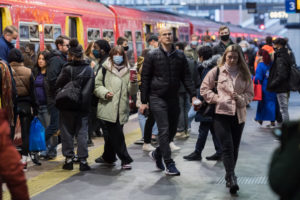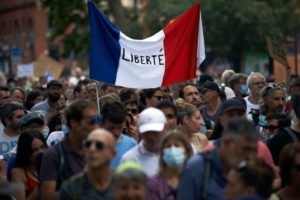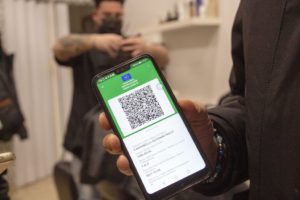-
February 2024
-
December 2023
-
November 2023
-
October 2023
- The Biden Impeachment Inquiry – Lesson
- The Biden Impeachment Inquiry – Quiz
- Israel vs Hamas: One Week in and Still at War – Lesson
- Israel vs Hamas: One Week in and Still at War – Quiz
- 2023 Nobel Prizes Announced – Lesson
- 2023 Nobel Prizes Announced – Quiz
- Trump Ordered Not to Mention Case Against Him – But Will It Last? – Lesson
- Trump Ordered Not to Mention Case Against Him – But Will It Last? – Quiz
-
September 2023
-
August 2023
-
July 2023
-
May 2023
-
February 2023
-
December 2022
-
November 2021
-
September 2022
-
August 2022
- The US Visits Taiwan Again – What Impact Will It Make? – Lesson
- The US Visits Taiwan Again – What Impact Will It Make? – Quiz
- Cold Showers and Hot Days: Europe Limits People’s Energy Use – Lesson
- Cold Showers and Hot Days: Europe Limits People’s Energy Use – Quiz
- Hidden Art Is Being Discovered Around the World – Lesson
- Hidden Art Is Being Discovered Around the World – Quiz
-
July 2022
- Last WWII Medal of Honor Recipient Will ‘Lie in State’ at US Capitol – Lesson
- Last WWII Medal of Honor Recipient Will ‘Lie in State’ at US Capitol – Quiz
- Canada and Denmark Make a Deal over Disputed Arctic Island – Lesson
- Canada and Denmark Make a Deal over Disputed Arctic Island – Quiz
- Texas Schools Spark Debate: What Should Kids Wear in Class? – Lesson
- Texas Schools Spark Debate: What Should Kids Wear in Class? – Quiz
-
June 2022
- New York Court Says: An Elephant is Not a Human – Lesson
- New York Court Says: An Elephant is Not a Human – Quiz
- Finance Classes at School – A New Trend? – Lesson
- Finance Classes at School – A New Trend? – Quiz
- NASA Will Study UFOs for the First Time – Lesson
- NASA Will Study UFOs for the First Time – Quiz
- New York City Removes Last Payphone – Or Does It? – Lesson
- New York City Removes Last Payphone – Or Does It? – Quiz
- US Hosts ‘Summit of the Americas’ – Lesson
- US Hosts ‘Summit of the Americas’ – Quiz
- The National Spelling Bee – A Time-Honored Tradition – Lesson
- The National Spelling Bee – A Time-Honored Tradition – Quiz
- Queen Elizabeth Marks 70 Years on Throne with Platinum Jubilee – Lesson
- Queen Elizabeth Marks 70 Years on Throne with Platinum Jubilee – Quiz
- Lifeguard Shortage Could Limit Summer Swimming – Lesson
- Lifeguard Shortage Could Limit Summer Swimming – Quiz
-
May 2022
- American Artist Warhol’s Painting Sells for Record Price – Lesson
- American Artist Warhol’s Painting Sells for Record Price – Quiz
- Western US Suffering From Harsh Drought – Lesson
- Western US Suffering From Harsh Drought – Quiz
- Time to Say Goodbye to Incandescent Lightbulbs? – Lesson
- Time to Say Goodbye to Incandescent Lightbulbs? – Quiz
- Tibetan Leader Visits Washington to Gain Support for His Culture – Lesson
- Tibetan Leader Visits Washington to Gain Support for His Culture – Quiz
-
April 2022
- Masks on Public Transport – Needed or Not? – Lesson
- Masks on Public Transport – Needed or Not? – Quiz
- Shanghai Under Strict Lockdown in ‘Zero-COVID’ China – Lesson
- Shanghai Under Strict Lockdown in ‘Zero-COVID’ China – Quiz
- Are Roundabouts a Good or Bad Addition to US Cities? – Lesson
- Are Roundabouts a Good or Bad Addition to US Cities? – Quiz
- Is it Chicken Kiev or Kyiv? A Scrumptious Spelling Problem – Lesson
- Is it Chicken Kiev or Kyiv? A Scrumptious Spelling Problem – Quiz
- Ketanji Brown Jackson Confirmed as Next Judge to Join Supreme Court – Lesson
- Ketanji Brown Jackson Confirmed as Next Judge to Join Supreme Court – Quiz
- Gas Prices Rise Dramatically Across America – Lesson
- Gas Prices Rise Dramatically Across America – Quiz
- Washington, DC Celebrates 110 Years of Cherry Blossoms in the City – Lesson
- Washington, DC Celebrates 110 Years of Cherry Blossoms in the City – Quiz
- Billionaire Elon Musk Tries to Buy Twitter – Lesson
- Billionaire Elon Musk Tries to Buy Twitter – Quiz
- Meet Patron, Ukraine’s Mine-Sniffing ‘Hero’ Dog – Lesson
- Meet Patron, Ukraine’s Mine-Sniffing ‘Hero’ Dog – Quiz
- Top American Officials Visit Ukraine in Secret – Lesson
- Top American Officials Visit Ukraine in Secret – Quiz
-
March 2022
- Supply Chain Crisis: Are Pop-Up Sites the Answer? – Lesson
- Supply Chain Crisis: Are Pop-Up Sites the Answer? – Quiz
- Fare Evaders Beware: New York Mayor to Tackle Subway Crime? – Lesson
- Fare Evaders Beware: New York Mayor to Tackle Subway Crime? – Quiz
- Time’s Up For Switching Clocks? Congress Considers Daylight Saving – Lesson
- Time’s Up For Switching Clocks? Congress Considers Daylight Saving – Quiz
- Ukraine’s President Addresses Congress as War Persists – Lesson
- Ukraine’s President Addresses Congress as War Persists – Quiz
- No More Meat? New York Mayor Decrees Vegan Fridays for Schools – Lesson
- No More Meat? New York Mayor Decrees Vegan Fridays for Schools – Quiz
- Big Business Shuns Russia Over Ukraine Invasion – Lesson
- Big Business Shuns Russia Over Ukraine Invasion – Quiz
- ‘People’s Convoy’ Loops Around US Capital in COVID Protest – Lesson
- ‘People’s Convoy’ Loops Around US Capital in COVID Protest – Quiz
- From Train Robberies to Stores – US Sees a Rise in Crime – Lesson
- From Train Robberies to Stores – US Sees a Rise in Crime – Quiz
- President Biden Gives His First State of the Union Speech – Lesson
- President Biden Gives His First State of the Union Speech – Quiz
-
February 2022
- Ukraine War Continues as Peace Talks Begin – Lesson
- Ukraine War Continues as Peace Talks Begin – Quiz
- US States Say Farewell to COVID Rules – Lesson
- US States Say Farewell to COVID Rules – Quiz
- Russia Launches Invasion of Ukraine – Lesson
- Russia Launches Invasion of Ukraine – Quiz
- Feuds Erupt as States Redraw Voting Maps – Lesson
- Feuds Erupt as States Redraw Voting Maps – Quiz
- Monobob Makes Olympic Debut – Lesson
- Monobob Makes Olympic Debut – Quiz
- Canadian Truckers Stage Major Protest Against COVID Laws – Lesson
- Canadian Truckers Stage Major Protest Against COVID Laws – Quiz
- U.S. Sends Troops to Europe as Ukraine-Russia Tensions Rise – Lesson
- U.S. Sends Troops to Europe as Ukraine-Russia Tensions Rise – Quiz
- Winter Olympics Begin in Beijing Amid Calls for Boycott – Lesson
- Winter Olympics Begin in Beijing Amid Calls for Boycott – Quiz
- Afghanistan Faces a ‘Tsunami of Hunger’ Under the Taliban – Lesson
- Afghanistan Faces a ‘Tsunami of Hunger’ Under the Taliban – Quiz
- Dealing With Omicron: COVID Rules Around the World – Lesson
- Dealing With Omicron: COVID Rules Around the World – Quiz
-
January 2022
- Teen Pilot Becomes Youngest Girl to Fly Solo Around the World – Lesson
- Teen Pilot Becomes Youngest Girl to Fly Solo Around the World – Quiz
- No More Meat and Potatoes? Supply Down and Prices Up – Lesson
- No More Meat and Potatoes? Supply Down and Prices Up – Quiz
- Flight Confusion as 5G Causes Safety Worries – Lesson
- Flight Confusion as 5G Causes Safety Worries – Quiz
- English Translations on French ID Cards? Some say ‘Non!’ – Lesson
- English Translations on French ID Cards? Some say ‘Non!’ – Quiz
- Omicron: Did COVID Catch the Common Cold? – Lesson
- Omicron: Did COVID Catch the Common Cold? – Quiz
- Five Countries Agree: Nuclear War Must Be Avoided – Lesson
- Five Countries Agree: Nuclear War Must Be Avoided – Quiz
- Enes Kanter’s American Dream Come True – Lesson
- Enes Kanter’s American Dream Come True – Quiz
- U.S. Bans Products Linked to Uighur Slavery – Lesson
- U.S. Bans Products Linked to Uighur Slavery – Quiz
- Time Capsules Found in Base of Robert E. Lee Statue – Lesson
- Time Capsules Found in Base of Robert E. Lee Statue – Quiz
-
December 2021
- Russia and US Lock Horns Over Ukraine Border – Lesson
- Russia and US Lock Horns Over Ukraine Border – Quiz
- US Military Starts New UFO Research Group – Lesson
- US Military Starts New UFO Research Group – Quiz
- Omicron COVID Strain Comes Out of South Africa – Lesson
- Omicron COVID Strain Comes Out of South Africa – Quiz
-
November 2021
- La Niña Weather Patterns May Affect the US This Winter – Lesson
- La Niña Weather Patterns May Affect the US This Winter – Quiz
- Dads on Duty Help Out at Louisiana High School – Lesson
- Dads on Duty Help Out at Louisiana High School – Quiz
- The Price of Thanksgiving Goes Up in 2021 – Lesson
- The Price of Thanksgiving Goes Up in 2021 – Quiz
- Airlines Struggle with Flights Ahead of the Holidays – Lesson
- Airlines Struggle with Flights Ahead of the Holidays – Quiz
-
October 2021
- Crisis and Kidnappings in Haiti – Lesson
- Crisis and Kidnappings in Haiti – Quiz
- US Feels Effects of Computer Chip Shortage – Lesson
- US Feels Effects of Computer Chip Shortage – Quiz
- California Oil Spill Investigations – Lesson
- California Oil Spill Investigations – Quiz
- Michigan Governor Vows to Fix Lead-Infected Water Supply – Lesson
- Michigan Governor Vows to Fix Lead-Infected Water Supply – Quiz
- Nobel Prize Winners Announced – Lesson
- Nobel Prize Winners Announced – Quiz
- COVID and School – Rules Vary Across the Nation – Lesson
- COVID and School – Rules Vary Across the Nation – Quiz
- Toilet Paper Shortage 2.0? – Lesson
- Toilet Paper Shortage 2.0? – Quiz
- A Very Merry COVID Homecoming? – Lesson
- A Very Merry COVID Homecoming? – Quiz
- Merck COVID Pill – A New Way to Treat the Virus? – Lesson
- Merck COVID Pill – A New Way to Treat the Virus? – Quiz
- Eruptions at La Palma and Kilauea Volcanoes – Lesson
- Eruptions at La Palma and Kilauea Volcanoes – Quiz
-
September 2021
- US Joins UK and Australia in ‘AUKUS’ Defense Deal – Lesson
- US Joins UK and Australia in ‘AUKUS’ Defense Deal – Quiz
- Rules Change for Travelers to the US – Lesson
- Rules Change for Travelers to the US – Quiz
- Is There a Crisis at the Southern Border? – Lesson
- Is There a Crisis at the Southern Border? – Quiz
- What’s Going On With COVID-19? – Lesson
- What’s Going On With COVID-19? – Quiz
- Biden Announces 6-Step COVID Plan – Lesson
- Biden Announces 6-Step COVID Plan – Quiz
- Private Rescue Missions in Afghanistan – Lesson
- Private Rescue Missions in Afghanistan – Quiz
- China’s Crackdown on Video Games – Lesson
- China’s Crackdown on Video Games – Quiz
-
August 2021
- US Military Has Left Afghanistan – But What About Those Left Behind? – Lesson
- US Military Has Left Afghanistan – But What About Those Left Behind? – Quiz
- Hurricane Ida Tests New Orleans – Lesson
- Hurricane Ida Tests New Orleans – Quiz
- Records Set for Paralympic Games – Lesson
- Records Set for Paralympic Games – Quiz
- Storms in Tennessee and Northeast Cause Floods – Lesson
- Storms in Tennessee and Northeast Cause Floods – Quiz
Dealing With Omicron: COVID Rules Around the World – Lesson

Restrictions are over in the U.K. (Photo credit should read Wiktor Szymanowicz/Future Publishing via Getty Images)
Some countries are easing the rules, while others are getting stricter.
The Omicron variant of COVID-19 has upset the entire world. Some nations say this milder version of the virus could signal a return to normal life, while others are still trying to keep COVID away at all costs. Countries across the globe are trying different tactics, but which are having the most success and what are their methods?
Tactic 1: Return to Normal Life
While some countries are resorting to lockdowns, fines, and everything imaginable in the name of stopping the spread of COVID, others have taken a step back.
United Kingdom
On January 27, the United Kingdom lifted all COVID restrictions. This means COVID passports will no longer be needed to attend large events, and there are no more mask mandates. The government has also stopped asking people to work from home or self-isolate.
The U.K. had imposed strict rules after the Omicron outbreak in November but is now pulling back. The first Omicron case in that country was documented on November 27. The British government tried to slow the spread of the virus with mask and vaccine mandates. It made no difference. Despite all efforts, Omicron cases peaked January 5.
While a “Plan B” had been in place to impose stricter rules, this was canceled after it was discovered that government staff had broken lockdown rules.
Denmark
 Søren Brostrøm, director of the Danish Health Authority, told the press the country is looking at treating COVID-19 like a normal seasonal flu rather than a pandemic. Rather than vaccine mandates, passports, lockdowns, masks, and social distancing, he said they are considering “a seasonal vaccine targeting only risk groups,” meaning the elderly and people who are at-risk. Other Scandinavian countries greeted this news with similar ideas; Norway announced it would ease its restrictions, too.
Søren Brostrøm, director of the Danish Health Authority, told the press the country is looking at treating COVID-19 like a normal seasonal flu rather than a pandemic. Rather than vaccine mandates, passports, lockdowns, masks, and social distancing, he said they are considering “a seasonal vaccine targeting only risk groups,” meaning the elderly and people who are at-risk. Other Scandinavian countries greeted this news with similar ideas; Norway announced it would ease its restrictions, too.
South Africa
South Africa was one of the first countries to experience the Omicron variant. Instead of new restrictions, the government did nothing to stop the virus. There were practically no lockdowns, social distancing, or limits on movement. People were busy surviving daily life, and buses were packed full. Omicron emerged in South Africa sometime around mid-November, and the virus peaked on December 18. Since then, African scientists have been some of those saying Omicron could signal the end of the pandemic.
Tactic 2: More Restrictions
Quebec, Canada
Quebec, the second most populated province in Canada, announced on January 18 that it will be fining the unvaccinated. Although the amount is not settled, it is rumored to be “significant” and more than $100. They aren’t calling it a “fine.” Instead, as Premier Francois Legault said, “Those who refuse to get their first doses in the coming weeks will have to pay a new health contribution.”

Protesting vaccine mandates in France. (Photo by Alain Pitton/NurPhoto via Getty Images)
A curfew was also imposed where citizens cannot be out between 10 p.m. and 5 a.m. Shopping malls and hair salons may soon require proof of vaccination. About 25% (one quarter) of all Canadians live in Quebec. The province was one of the first to require vaccination proof for those who wished to go to restaurants, the gym, or sporting events.
France
France recently passed a law that unvaccinated people will be banned from restaurants, cafes, sporting events, and other recreational venues. Before, people were allowed to show a negative COVID test to get into these places, but now they have to provide proof of vaccination.
However, France, has announced plans to ease back on other COVID restrictions in February. The rollback will be done in stages, but one of the first things to go will be the requirement for indoor masks.
Italy
Italians who are 50 or older are required to get the COVID vaccination. If not, the unvaccinated could see a fine of up to 1,600 euros if they enter their workplace. As of January 20, Italy’s Super Green Pass is required for those who wish to use public transport or go to most public places. The pass shows that you have either been vaccinated or recovered from COVID in the last six months – a negative COVID test is not accepted.
Austria

Super Green Pass (Photo by Donato Fasano/Getty Images)
Austria became the first European nation to impose a general vaccine for everyone over the age of 18. Those who refuse to get the vaccine will be charged €3,600 ($4,100). Beginning in March, police will have the power to check vaccination status during routine stops; those who cannot provide proof will be fined up to €600 ($685).
China
China has a zero-COVID strategy that includes everything from lockdowns to quarantining cities. In December 2021, more than 13 million people in the city of Xi’an were ordered to stay in their homes. Only one person per household was allowed to leave the residence to get food and other essentials, but only once every couple of days. Long-distance bus stations were closed to prevent anyone from leaving the area – or going into it.
COVID and the United States
On Sunday, January 23, a large protest against vaccine mandates took place in Washington, D.C. The rally was a reaction to a new city rule that some businesses have to check that customers over the age of 12 have been vaccinated.

(Photo by Karen Ducey/Getty Images)
In other parts of the country, vaccine mandates, mask requirements, and other restrictions are imposed differently, as each state has its own rules. Some are more lenient, while others are still using mask mandates and restricting unvaccinated people from going to the movies, restaurants, gyms, and other entertainment venues.
What Next?
It is easy to see there isn’t a set rulebook that everyone is following when it comes to COVID. Some regions have decided to treat the virus as a part of normal life, just like the flu or common cold. Others are trying to eradicate the disease from their societies. What do you think is the right strategy?